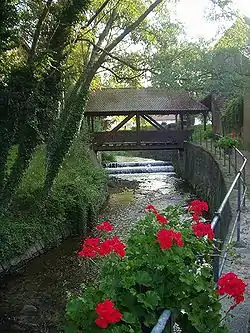| Kander | |
|---|---|
 The river as it flows through Kandern | |
| Location | |
| Country | Germany |
| State | Baden-Württemberg |
| Physical characteristics | |
| Source | |
| • location | Hochblauen, Germany |
| • coordinates | 47°46′42″N 07°42′05″E / 47.77833°N 7.70139°E |
| • elevation | 1,000 m (3,300 ft) |
| Mouth | |
• location | Rhine, Germany |
• coordinates | 47°37′51″N 7°34′09″E / 47.6308°N 07.5691°E |
• elevation | 250 m (820 ft) |
| Length | 30.0 km (18.6 mi)[1] |
| Basin size | 94 km2 (36 sq mi)[1] |
| Discharge | |
| • location | Rhine |
| Basin features | |
| Tributaries | |
| • right | Lippisbach, Feuerbach, Wollbach |
| Progression | Rhine→ North Sea |
The Kander is a small river flowing from the southern Black Forest westward into the Rhine.
Geography
The Kander rises at the head of the Kandertal on the Blauen in the Black Forest. Within the first 10 km of its course to Kandern, the Kander loses 650m of elevation. The stream has a total length of 30 km and a drop of 750m to its mouth on the Rhine near the community Märkt of the town Weil am Rhein.
History
The name Kander comes from the Celtic word kandera, meaning clear flowing.
Transport uses
Due to the stream's small size it has no transportation function.
References
External links
This article is issued from Wikipedia. The text is licensed under Creative Commons - Attribution - Sharealike. Additional terms may apply for the media files.